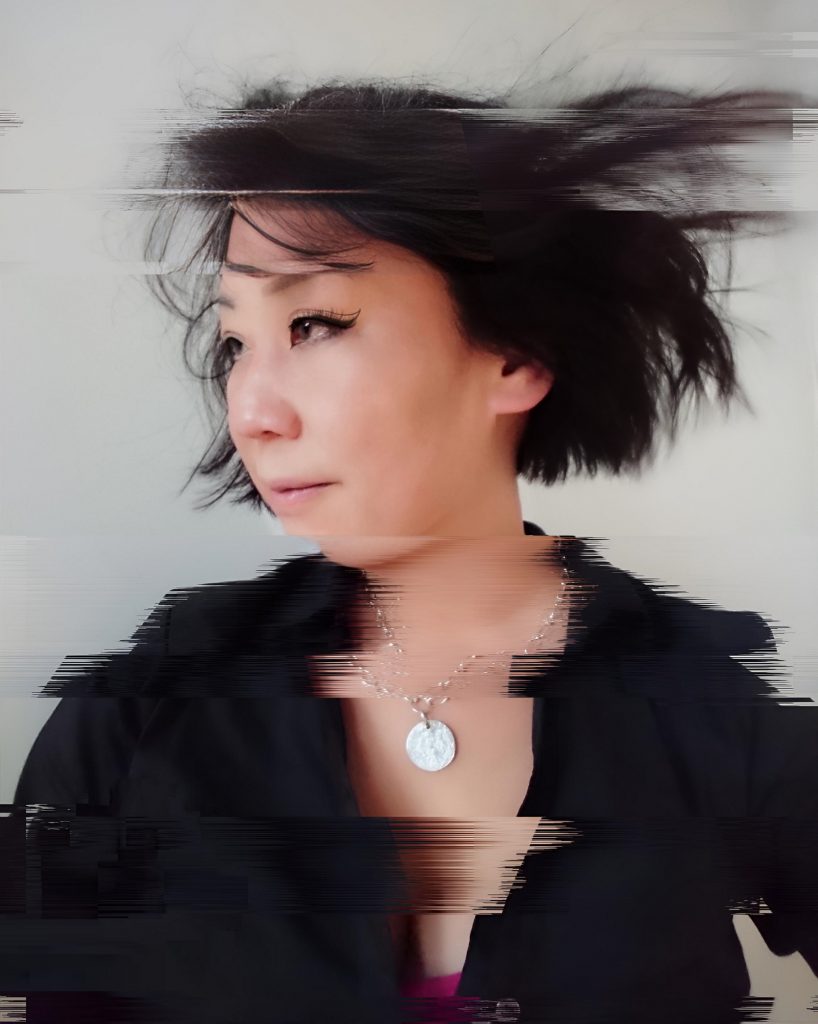By Keith Walsh As a Japanese musical artist working in Europe, Sienná brings sounds from her unique perspective to global music. In our conversation, we discuss the inspirations behind her brilliant new album ‘Wa-Kei-Sei-Jyaku’, her composing processes, and the beauty and simplicity of Wabi-sabi philosophy. (My album review is here at synthbeat.com)
Synthbeat: The songs on Wa-Kei-Sei-Jyaku capture a sense of the sacred. Could you describe your emotional experience when encountering the Tenkawa Shrine –and what were your first steps in composing a song cycle about these experiences?
Sienná: Tracks 1, 2, 4, 5 and 7 are about the Tenkawa shrine, that is associated with the deity of art, music and water. Unfortunately, my memories from there were/are quite blurry. That was a long, long time ago. So I wanted to describe what I remembered in sounds to reconstruct how it was like to be there. ‘So May It Be,” for instance, is a visualization of me purifying hands, entering the shrine, making offerings before clapping hands twice to make a wish. On other tracks, I also tried to describe me standing deep in the mountains, breathing the cool forest air, and being amazed by the purity of water etc. I heard that the ‘kannushi’ (priest) organized a trance music event inside the shrine before. I must be there again.
Synthbeat: How does Wabi-sabi philosophy influence your daily life?
Sienná: Mostly I do my very best in many things every day, but without trying to achieve so-called perfection. I´ve seen so many perfectionists who beat themselves up in an unhealthy mindset. Instead of being one of them, I decided to accept that things are meant to be just as they are. There is nothing perfect in this life. I find the Kintsugi philosophy extremely interesting too. Things can fall apart sometimes. But we can redeem the brokenness into something beautiful and unique.
Synthbeat: With the album title in Japanese, are you concerned about limiting your audience? How do you translate and explain the title?
Sienná: It didn´t feel right to name it in English this time. But no, I´m not concerned at all. I believe my listeners are mostly curious types of people who are open, or at least tolerant for something new and different. This is also one of the widely known ‘Yojijukugo’ which refers to compound words consisting of four Chinese characters in Japan. Wa Kei Sei Jyaku (harmony, respect, purity and tranquility) are the four principles of “the way of Tea” as left by the tea master Sen no Rikyu (1522-1591) who is guiding me on wabi-sabi 432 years after his death.
Synthbeat: Are you familiar with Bowie’s ‘Low’ and ‘Heroes,” and do you recognize a kindred spirit in some of the sounds and melodies here on your new alb Wa-Kei-Sei-Jyaku? Of course, in several instances he and Brian Eno were riffing from Japanese culture!|
Sienná: I´ve received feedback that my music reminded them of Brian Eno, but I started to listen to him properly quite recently. Maybe his and my influence comes originally from similar place, like Claude Debussy, Erik Satie, Frédéric Chopin, Camille Saint-Saëns etc – but that´s my personal guess.
Synthbeat: What’s your opinion of the Western embracing of Eastern thought and art?
Sienná: It´s just a matter of perspective and interpretation, isn´t it. I´m not an expert in visual arts, but I´ve always been fascinated by the Japonisme art in the 1800s. The world is now full of information, (it’s) so much more multicultural, intercultural and cross-cultural. This new norm might not be conflict-free of course, but it´s there for anyone. I think it really doesn´t need to limit the possibility of who should and shouldn´t do what and how, as long as mutual respect is present.
Synthbeat: You seem to abandon the pop format for the most part on the album. What processes did you use to construct these songs? For example, did you start with diagrams?
Sienná: It feels good that I have nothing to do with pop! That was not my intention anyway. Method-wise I did nothing new, either. As always, I started from bits and pieces that I had noted, built and expanded to longer sequence. But I can tell you that I did things even more freely this time. You can hear on ‘One Life, One Encounter’ that I intentionally broke a rhythmic cycle twice, only because it felt right for my ears.
Synthbeat: What music making or listening experience prepared you to make this album? Have you played any Japanese stringed or woodwind instruments?
Sienná: The album was recorded in covid-19 lockdowns. Fortunately I already had the necessary setup for home recordings with good headphones, but had no access to unplugged instruments due to restrictions. No, I´ve played neither Shamisen nor Koto. I´m a bit interested in Koto, but it´s expensive enough to stop me and think I would rather buy a software synth if I had so much extra money. I know Shakuhachi is an extremely difficult instrument, so I wouldn´t spend time for it just out of curiosity.
Synthbeat: How was it a challenge to write melodies in Eastern scales?
Sienná: It´s never a challenge to use the Eastern pentatonic scales when you grew up with them in daily context. Possible I was more exposed to such scales through traditional music in Kyoto.
But classic folk songs for kids, sound effects on popular TV shows, Enka songs, even the jingle music you hear at train stations – they are everywhere.
Sienná Web
Sienná On YouTube
Sienná On Bandcamp
‘We-Kei-Sei-Jyaku’ Album Review At Synthbeat.com
finis

